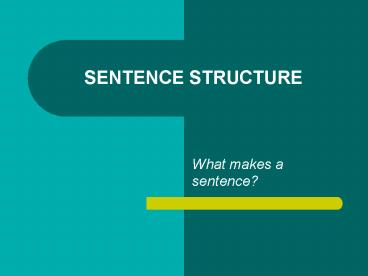SENTENCE STRUCTURE - PowerPoint PPT Presentation
1 / 21
Title: SENTENCE STRUCTURE
1
SENTENCE STRUCTURE
- What makes a sentence?
2
A sentence has two main parts
- Subject
- The noun (or pronoun) that names who or what the
sentence is about.
3
A sentence has two main parts
- Subject
- The noun (or pronoun) that names who or what the
sentence is about. - Predicate
- Includes a verb that tells about the subject
4
A sentence has two main parts
- Example
- My crazy kitties pounce on my bed.
5
A sentence has two main parts
- Example
- My crazy kitties pounce on my bed.
- Who or what is the sentence about?
- my crazy kitties
- so that is the complete subject of my sentence
6
A sentence has two main parts
- Example
- My crazy kitties pounce on my bed.
- What does the sentence tell me about my subject,
my crazy kitties? - It tells me that they pounce on my bed
- So pounce on my bed is the complete predicate
of the sentence
7
A sentence has two main parts
- Example
- My crazy kitties pounce on my bed.
- Complete complete
- subject predicate
8
Break these sentences into their two main parts
- On questions 1-30, draw a vertical line between
the complete subject and the complete predicate - School House Rocks
- Every other person, tear a sheet of paper in half
and share it with your neighbor
9
Sentence fragments
- Not a complete sentence
- The lion with the huge mane and snarling mouth.
- Was quiet.
- Do questions 31-40
10
Simple Subject and Simple Predicates
- In the subject, there is the key noun, pronoun or
group of words that can NOT be left out of the
subject. This is the simple subject. - In a complete predicate, there is the verb or
verb phrase that can NOT be left out of the
predicate
11
Simple Subject Simple Predicate
- Example
- My crazy kitties pounce on my bed.
- What is the key word in the subject?
- What is the verb in the predicate?
12
Simple Subject Simple Predicate
- Example
- My crazy kitties pounce on my bed.
- What is the key word in the subject? kitties
- What is the verb in the predicate? pounce
13
Simple Subject and Simple Predicate
- On questions 1-30
- Underline the simple subject and
- circle the simple predicate (verb or verb phrase)
in each
14
Compound subjects
- Sometimes there is more than one subject in the
complete subject. - They have the same verb
- They are joined by and or or
- Example
- Tuxie and Trixie pounce on my bed.
15
Compound subject
- Sometimes there is more than one subject in the
complete subject. - They have the same verb
- They are joined by and or or
- Example
- Tuxie and Trixie pounce on my bed.
16
Tuxie and Trixie pounce on my bed.
17
Compound Subjects
- Questions 41-50
18
Compound Verbs
- Two or more verbs that have the same complete
subject and are joined by and or or - Example
- My crazy kitties run, jump, and pounce on my bed.
19
Compound Verbs
- Two or more verbs that have the same complete
subject and are joined by and or or - Example
- My crazy kitties run, jump, and pounce on
- my bed.
20
Compound Verbs
- Questions 51-60
- Note Some of these might have both compound
subjects and verbs.
21
Why compound subjects and verbs?
- They can make your writing more interesting by
combining several related thoughts into one
sentence. By doing this you may eliminate having
so many short choppy sentences. - Paragraph for 61.































